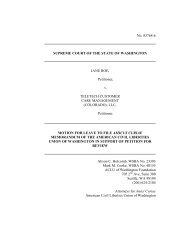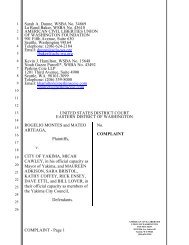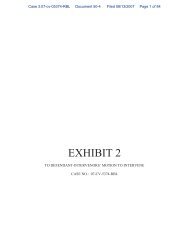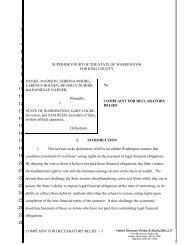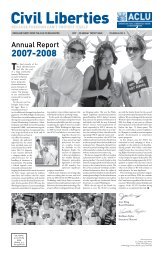BERGER v. CITY OF SEATTLE - ACLU of Washington
BERGER v. CITY OF SEATTLE - ACLU of Washington
BERGER v. CITY OF SEATTLE - ACLU of Washington
Create successful ePaper yourself
Turn your PDF publications into a flip-book with our unique Google optimized e-Paper software.
<strong>BERGER</strong> v. <strong>CITY</strong> <strong>OF</strong> <strong>SEATTLE</strong><br />
225<br />
censorship in the text or application <strong>of</strong> Rules F.1 and F.2.<br />
These rules do not permit discretion in issuing permits; a permit<br />
“is issued upon [the] Director’s satisfaction that the information<br />
set forth in the application is true, the applicant has<br />
executed a statement stating that he or she will comply with<br />
applicable law and all provisions <strong>of</strong> the Seattle Center rules,<br />
and has paid the applicable application fee.” (emphasis<br />
added). The Director has no power to reject a completed permit<br />
application. While the Director may terminate or revoke<br />
a permit, even that decision depends upon the satisfaction <strong>of</strong><br />
objective criteria or requires 7-day notice.<br />
Berger <strong>of</strong>fers absolutely no evidence revealing content censorship,<br />
and we will not presume that the city will read or<br />
apply its permit rule to allow such censorship, especially at<br />
the summary judgment stage. See Cox, 312 U.S. at 577<br />
(rejecting a claim <strong>of</strong> impermissible discretion where “[t]here<br />
is no evidence that the statute has been administered otherwise<br />
than in the fair and non-discriminatory manner which the<br />
state court has construed it to require”). Indeed, the evidence<br />
shows that the Director has granted permits even to street performers<br />
with a history <strong>of</strong> complaints against them, such as Berger.<br />
23<br />
Like the valid licensing schemes in Poulos, Cox, and<br />
Thomas, the Seattle Center’s permit requirement is narrowly<br />
tailored to further valid governmental objectives and suffers<br />
neither from a discretion-based potential for censorship nor<br />
from overbreadth.<br />
Like the Supreme Court’s precedents, our own caselaw<br />
confirms that we have no basis to invalidate the permit<br />
requirement at bar. The district court’s reliance on Grossman<br />
v. City <strong>of</strong> Portland, 33 F.3d 1200 (1994), was misplaced. In<br />
Grossman, we struck down a content-neutral permit scheme<br />
23 The record reveals that “[i]n the year prior to the permit system, 70%<br />
<strong>of</strong> [the] performer complaints came from Michael Berger . . . and/or were<br />
in regards to him,” yet Berger received a permit to perform in the Seattle<br />
Center the very next year.




